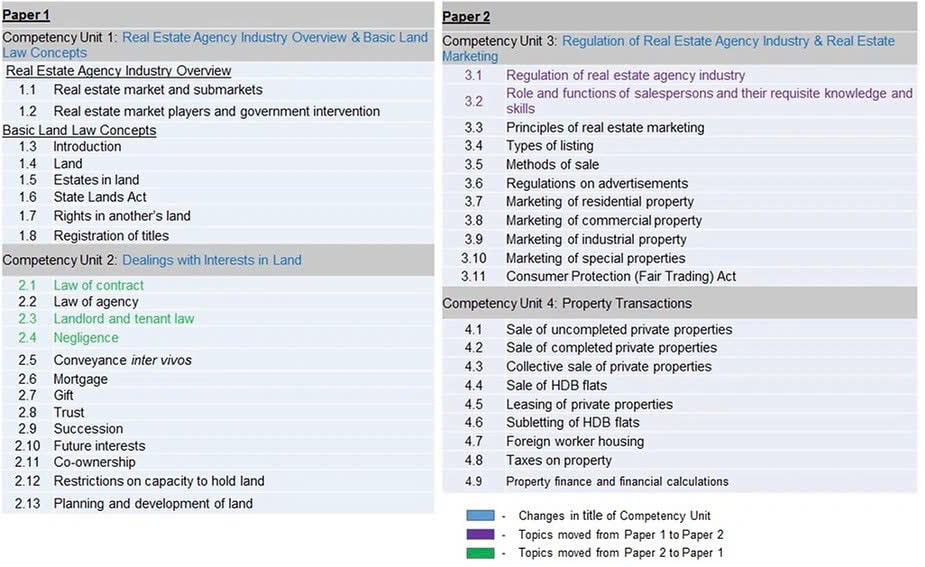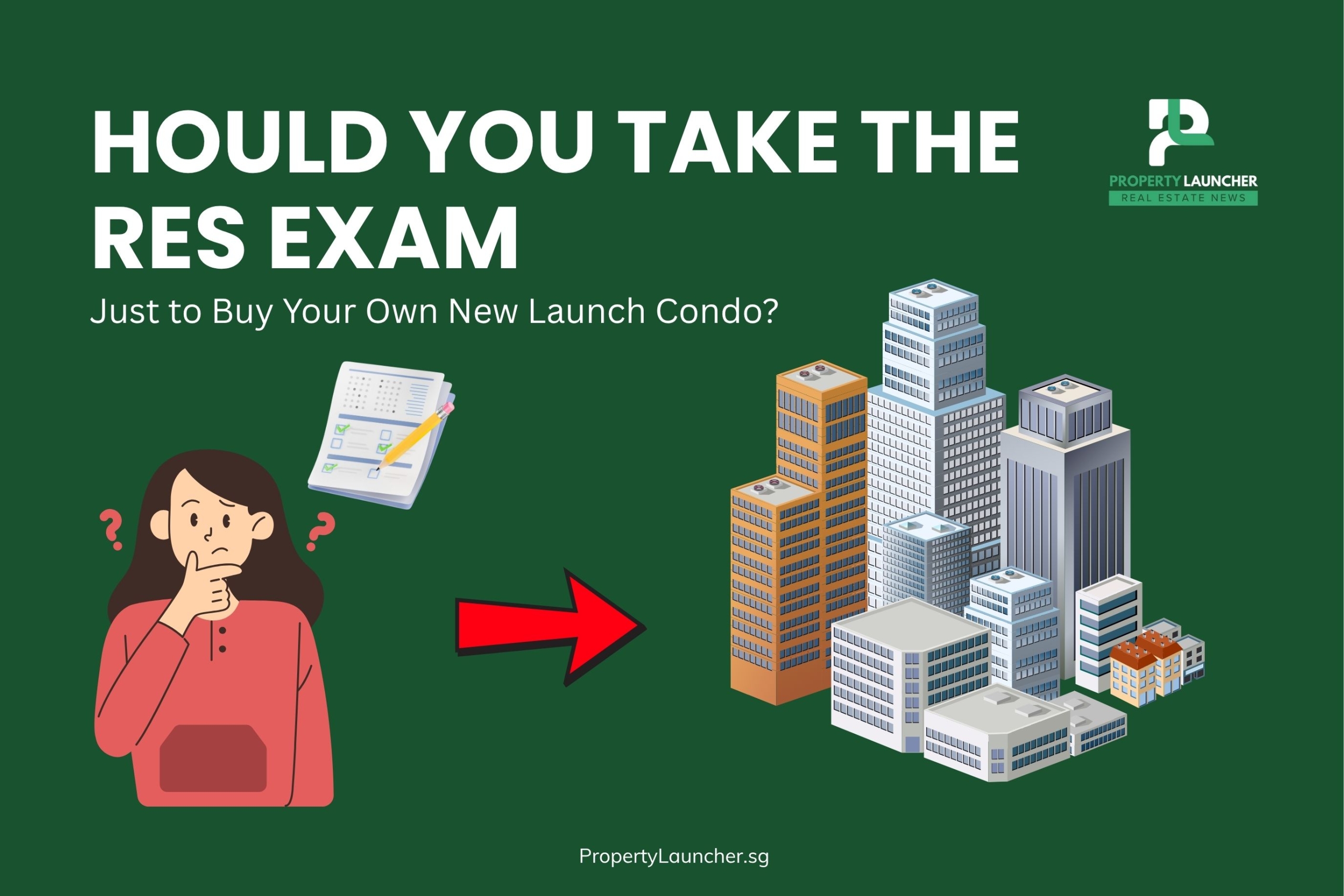In Singapore’s booming property scene, more aspiring homeowners are asking a new question:
“If I pass the RES exam and become a licensed agent, can I buy my new launch condo with my license and earn the commission?“
It sounds clever — save 1–3% of the price, understand the market better, and maybe even start a side career in real estate.
But as the Reddit thread “Become Property Agent for Own New Launch Condo” shows, reality is far more complicated. While the idea feels smart, the rules, effort, and risks behind it tell a very different story.
Let’s break down with Property New Launch about what really happens when you try to get your RES (Real Estate Salesperson)license for personal buying purposes — and whether it’s worth the time, money, and mental energy.

What the RES Exam Really Is — and Isn’t
The RES Exam, conducted by the Council for Estate Agencies (CEA), is Singapore’s gateway into the professional property industry. Passing both papers allows you to register as a licensed real estate salesperson under an agency.
But here’s the crucial distinction:
You’re not becoming a “private investor with perks” — you’re becoming a regulated intermediary bound by strict ethics and client care standards. That means:
- You can legally buy property for yourself.
- But you cannot represent yourself as your own agent or claim the buyer’s commission. Sorry.
CEA’s rulebook makes this crystal clear:
You may not act for yourself and your agency simultaneously in the same transaction.
Why?
Because it’s a conflict of interest — you can’t serve a client’s interests (the developer’s) while being the buyer.
So, no — passing the RES exam doesn’t automatically give you a “cashback” when buying your own new launch condo.
Why the Rule Exists — Ethics and Market Integrity
The ban on “self-representation” isn’t red tape. It’s ethical infrastructure — part of a wider set of Government Property Policies designed to preserve transparency, fairness, and trust in Singapore’s real estate market.
If agents could freely represent themselves, they might manipulate deals, distort pricing, or pressure developers for secret rebates. That would erode trust in the market — something Singapore’s real estate system cannot afford.
By keeping the agent and buyer roles separate, the CEA ensures:
- Transparency in commission flow.
- Fair treatment between buyers, sellers, and developers.
- Long-term confidence in HDB and private property systems.
It’s not about limiting opportunity; it’s about protecting credibility.
Real Stories: What People on the Ground Say
The Reddit community offers rare honesty. Here’s what actual Singaporeans and agents say about trying this path:
- “You cannot legally represent yourself and get the commission.”
Many users confirmed that CEA forbids dual representation. Developers also won’t pay commission if they know the buyer is a licensed salesperson. - “It’s not easy — I failed Paper 1 seven times.”
One commenter described the exam as far tougher than expected, especially for people without legal or finance backgrounds. - “You still need to join an agency and share commission.”
Even if you pass, your agency may take 10–30% of any commission earned from other deals. - “Becoming an agent delayed my buying plans.”
Several users regretted postponing their purchase for months — only to realize they couldn’t use their license to “save” on their own transaction.
In short: what sounds like a shortcut is actually a long detour.
What It Takes to Become a Licensed Agent (and What You Risk)
Here’s the real timeline, cost, and difficulty based on current standards:
| Step | Details | Time & Cost |
| 1. RES Course | Compulsory CEA-approved course (60+ hours) | ~S$800 |
| 2. Exam | 2 papers, held up to 3 times a year | S$425 per attempt |
| 3. Registration | Join a licensed agency & background check | ~1–2 months |
| 4. Pass Rate | ~40–50% per paper | Can take several attempts |

So even in the best case, you’re looking at 3–6 months of study, effort, and waiting before you can call yourself an agent. Meanwhile, your dream new launch unit might already be fully booked.
The Financial Math: Commission vs Opportunity Cost
Most new launches offer 2–3% commission to buyer’s agents.
If your goal is to “earn that back” by becoming your own agent, let’s do the math:
| Factor | Reality |
| Commission | Up to 3% of sale price (e.g., S$45k for a S$1.5M condo) |
| Agency Cut | Typically 10–30% retained by agency |
| Exam & Course Costs | ~S$1,200 total |
| Time Delay | 3–6 months or longer |
| Risk | You may fail or miss the project |
| Legality | Cannot represent yourself = no commission |
Result: even if everything went smoothly, you still can’t legally pocket that commission. And if you delay your purchase for six months, rising launch prices could erase any potential savings.
In other words, your opportunity cost exceeds your perceived gain.
The Hidden Benefit: Knowledge and Network
All that said, the RES exam isn’t useless — it’s actually a powerful investment if your goal is to play the long game.
1️⃣ Industry Knowledge That Lasts
The RES syllabus covers everything from land law to financial regulations.
You’ll learn:
- How to assess property value and legal risk.
- What loan restrictions (LTV, ABSD, TDSR) mean for investors.
- How to structure transactions and understand developer marketing.
That education makes you a smarter, more confident buyer — and potentially a future wealth builder.
2️⃣ Access to Insider Information
Licensed agents often get:
- Early project previews and price lists before public release.
- Access to developers’ sales portals.
- Real-time insights into demand and unit availability.
Even if you can’t collect your own commission, that access can still translate into strategic buying advantages.
3️⃣ Potential to Build a Side Career
Many working professionals who passed the RES exam use it for:
- Helping friends and family transact.
- Building a second income stream.
- Expanding into property investing or asset management later.
So if your goal extends beyond “saving commission,” the license is a strong long-term investment.
⚠️ The Myths and Mistakes People Make
From Reddit discussions and agent feedback, here are the top misconceptions that often mislead new buyers:
- Myth: “If I’m licensed, I can buy direct from the developer and earn commission.”
→ ❌ False. Developers don’t pay you when you’re the buyer. - Myth: “I can use a friend’s license to get the rebate.”
→ ⚠️ Risky and possibly illegal. Any hidden kickback violates both CEA ethics and bank loan disclosures. - Myth: “It’s an easy exam — I’ll just self-study.”
→ ❌ Many underestimate it. The legal and math components are tough; multiple attempts are common. - Myth: “It’s worth it just for one purchase.”
→ ⚠️ Only if you plan to stay in real estate long term does it make financial sense.
These misconceptions fuel disappointment among hopeful candidates — and you can see that clearly in community discussions.
Decision Matrix: Should You Take the Exam or Not?
Let’s simplify the decision with a realistic matrix.
| Profile | Should You Take RES Exam? | Why |
| Pure Buyer (1-time purchase) | ❌ No | Won’t save you money; delays your goal |
| Investor planning multiple properties | ⚙️ Maybe | Long-term knowledge and network value |
| Aspiring Agent / Career Switcher | ✅ Yes | Build a business and recurring income |
| Curious Hobbyist | ⚙️ Only if you enjoy learning | Educational, but not financially efficient |
Verdict:
If your goal is to buy one property, focus on negotiation, not licensing.
If your goal is to understand the industry or diversify income, go for it — strategically.
Realistic Scenarios: Best, Worst, and Average Outcomes
| Scenario | What Happens | Outcome |
| Best Case | You pass first try, join a good agency, learn fast, and use insights for a great purchase. | You gain long-term skills, network, and better deals. |
| Average Case | You take 2–3 attempts, spend ~$1.5k, and can’t use your license for your own unit. | You gain knowledge, but no immediate savings. |
| Worst Case | You fail multiple times, miss your desired launch, or violate CEA rules unknowingly. | Time lost, money wasted, possible compliance issue. |
That’s why experienced agents often tell buyers bluntly:
“If you’re doing it just for one deal — don’t bother. If you’re building a future in real estate — welcome aboard.”
The Bigger Picture: Real Estate Is a Profession, Not a Shortcut
Becoming a licensed RES is not a hack — it’s a commitment.
The course, ethics, and agency system are designed to professionalize an industry that deals with people’s life savings.
The Council for Estate Agencies (CEA), established in 2010, set out to protect both consumers and professionals. Its strict code of conduct ensures agents act in the client’s best interest — not their own.
That’s the difference between a transactional buyer and a real estate professional.
If you’re truly passionate about property, the RES journey can open doors — but if your aim is to “game” the system for one condo purchase, you’ll likely end up frustrated.
💬 FAQs
Q1: Can I buy a property for myself after passing the RES exam?
Yes, but you cannot act as your own agent or receive the buyer’s commission. You must declare your interest transparently.
Q2: Will I save money buying my new launch after getting licensed?
No. Developers pay commissions to agencies for client representation, not to buyers.
Q3: Is the RES exam easy to pass?
No. It’s challenging — pass rates hover around 40–50% per paper. Some candidates take multiple attempts.
Q4: How long does it take to become an agent?
Usually 3–6 months, including course, exams, and registration.
Q5: Is it worth taking the RES exam for personal knowledge?
Yes, if you’re serious about understanding real estate, investing smarter, or building a side career.
Think Career, Not Shortcut
Taking the RES exam just to buy your own condo is rarely worth it.
You won’t legally earn your own commission, and the time cost often outweighs the benefit.
But if you’re genuinely interested in real estate — if you want to understand regulations, valuations, and trends from the inside — then the RES exam is one of the most empowering decisions you can make.

Don’t chase a one-time commission.
Build the knowledge and credibility that can reward you for decades.
Ready to explore the RES journey?
Start by understanding the CEA-approved course providers, upcoming exam windows, and real-life expectations.



 Discover Singapore’s latest launches in CCR, RCR, OCR and EC—complete with live price lists, PSF ranges, floor plans and daily refreshes.
Discover Singapore’s latest launches in CCR, RCR, OCR and EC—complete with live price lists, PSF ranges, floor plans and daily refreshes.
Join The Discussion